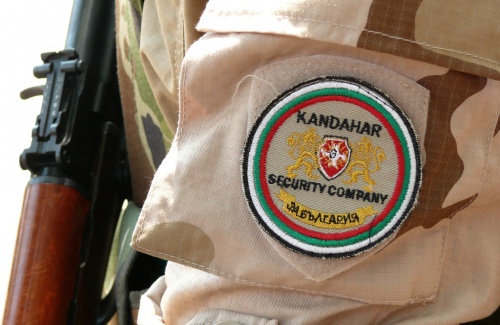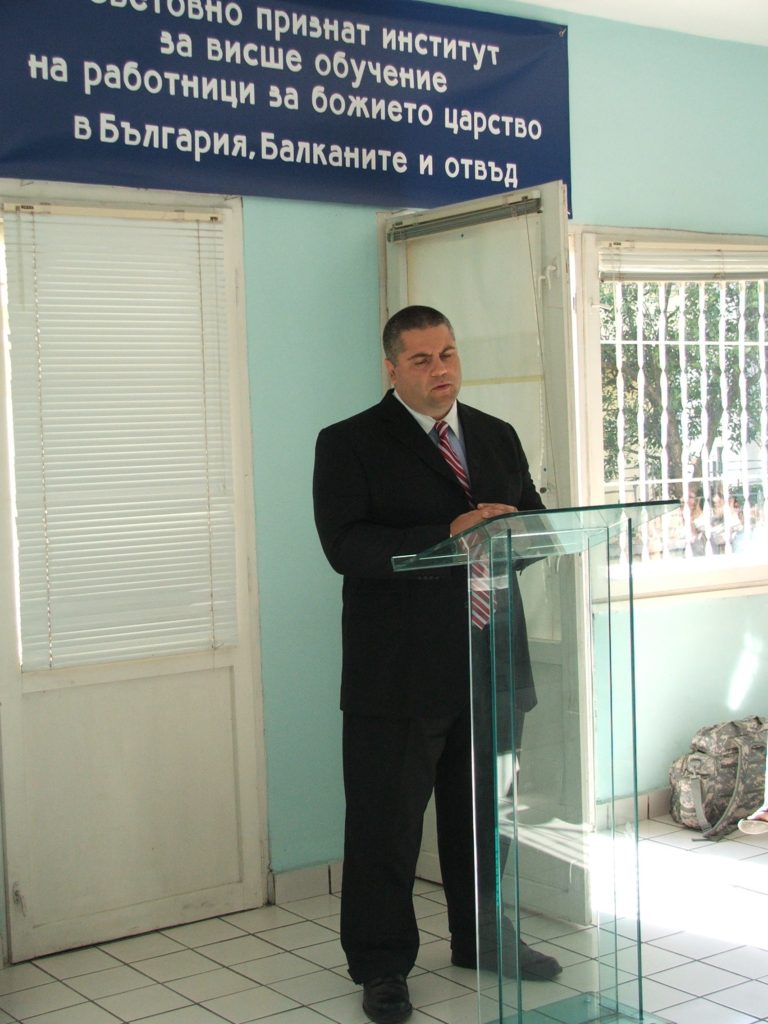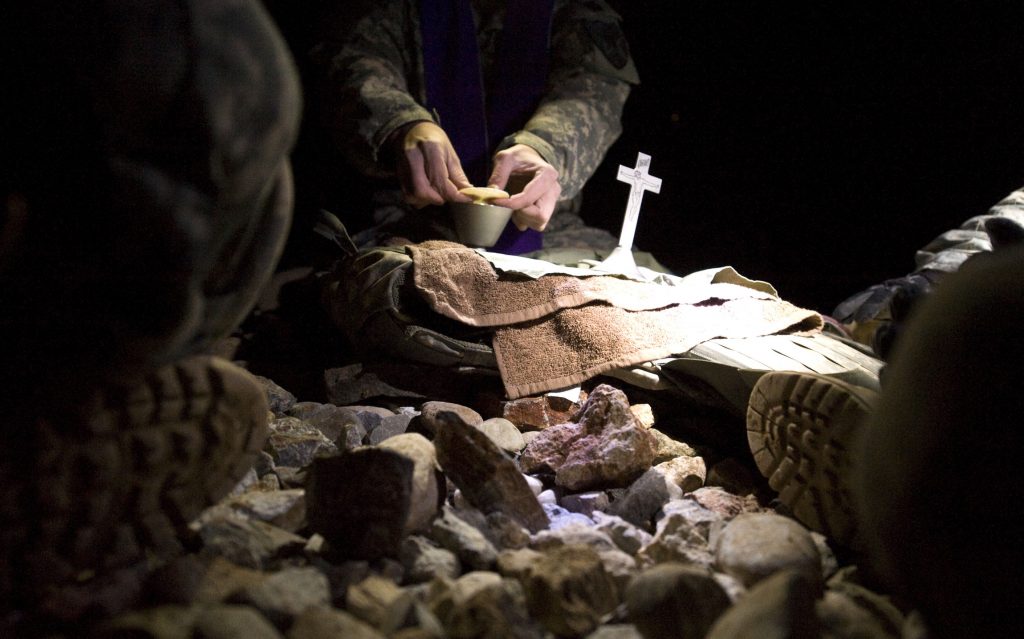Master’s of Chaplaincy Ministry Program in Bulgaria Renewed
 Master’s of Chaplaincy Ministry Program in Bulgaria Renewed (2010-2023)
Master’s of Chaplaincy Ministry Program in Bulgaria Renewed (2010-2023)
We are proud to announce that the Master’s of Chaplaincy Ministry Program, we designed and launched in Bulgaria in 2006, has been selected to be part of the Social Service Program of New Bulgarian University. After being for years a valuable part of the regular curriculum of the Bulgarian Evangelical Theological Institute and the St. Trivelius Institute in the capital Sofia, the chaplaincy program has received the highest level of recognition as successful graduates will be finally able to receive government recognized degrees and apply their knowledge and training in chaplaincy on a professional level. The chaplaincy program can also serve within the Integration Proposal of local NATO programs and be instrumental in dealing with the enormous wave of Middle East migrants crossing through Bulgaria today.
Although the Bulgarian Chaplaincy Association emerges from and ministers within the Bulgarian cultural context, it is designed for integral cooperation with organizations of various origins. This advantage comes from the experience of previous working relationships that the organizations represented within the Association have had with other non-Bulgarian organizations. The vision, structure and operation of the Association incorporate and comply with western styles of chaplaincy work on three levels (1) cultural, (2) educational and (3) governmental.
The cultural heritage of the Bulgarian Chaplaincy Association represents a valuable environment for integration of NATO forces within the local cultural setting. On a cultural level, various events and activities such as English speaking church services, fellowship of soldiers with local communities, hospitals, orphanages and other cultural experiences are available. Humanitarian aid projects are among the most efficient manner for integration within the local community.
On an educational level, there are possibilities on both sides. For example, Bulgarian language courses for the soldiers and English language courses for the local community could be implemented. The most important element within the education strategy perhaps may be education of chaplaincy workers, especially in the current context when Bulgaria is in a need of trained crisis counselors for cases of floods and other natural disasters. Finally, local and national government relations will assist in the change of the status of chaplaincy within the Bulgarian Army. Such an approach will have positive political implications, as chaplaincy becomes a mediator between the army, church and government.
The presented proposal integrates religious moral issues along with socio-political principles in the idea for chaplaincy within the Bulgarian Army. The implications of these principles project involvement of local NATO units in partnership with local Bulgarian organizations. In the case of chaplaincy within the Bulgarian Army, the proposed organization is the newly established Bulgarian Chaplaincy Association. Although political, social and economical issues remain in the scope of its work, the Association’s main priority is the renewal of spirituality within the army structure through cutting-edge chaplaincy ministry beyond the ecclesial gates into a world of war and insecurity. The Bulgarian Chaplaincy Association acts as an agent of spiritual restoration targeting morality within the Bulgarian Army with the Bulgarian chaplain as the key element in this process. For an army without spirituality is no army at all.
Chronology of Events:
2018 The Road toward a Balkan Multi-Ministry Center and Legal Status
2017 Bulgarian Chaplaincy Association: Legal Case Renewed
2015 Revisting the Integration Proposal with Local NATO Programs by Bulgarian Chaplaincy Association
2014 Bulgarian Chaplaincy Association: Vision and Resolution Reaffirmed
2012 First Class of the Master’s of Chaplaincy Ministry Program
2011 Master’s of Chaplaincy Ministry Program Continues
2010 Master’s of Chaplaincy Ministry Program begins in Sofia, Bulgaria
2009 Bulgarian Chaplaincy Association holds an introductory chaplaincy course in Yambol, Bulgaria
2008 The Case of a NATO Chaplaincy Model within the Bulgarian Army released
2007 Bulgarian Chaplaincy Associations Recognized by U.S. Department of State
2006 Registration for the Bulgarian Chaplaincy Association Rejected by Bulgarian Court
2005 The Bulgarian Chaplaincy Association presented before the Bulgarian Evangelical Alliance
2004 Three U.S. Bases in Bulgaria to be Built by 2010
2003 The Case of a NATO Chaplaincy Model within the Bulgarian Army
2002 First Balkan Chaplaincy Conference at the Central Church of God in Sofia, Bulgaria
2001 Church of God Chaplaincy Commission to visit Bulgaria
2000 Euro-seminar: Christian ethics in the military forces
1997 First Military Ministry Seminar in Veliko Tarnovo
The fall of the Berlin Wall introduced a new reality that Bulgaria was not prepared to embrace. The end of Communism was unable to tear down the communist mentality. Today, an entire Bulgarian generation lives with the scars inflicted by their experience under years of the Communist Regime, while another generation lives with an immense historical gap that has formed a new political, social, economical and cultural reality.
Three points are worth noting about Bulgaria’s Postcommunist context. First, in the beginning of the 21st century Bulgaria is left with armed forces, which were organized and influenced by the Soviet model and still act accordingly. The bureaucratic infrastructure disallows and discourages any changes apart from carefully chosen decisions that keep the army’s activities to the minimum possible. The two main factors needed for any change to occur, namely decision-making processes and chain of command, still operate under an Eastern Soviet paradigm.
Second, atheistic morale has gained the status of a positive military qualification in the Bulgarian military. This may sound familiar for any given army; however, in most cases it replaces a religious attitude with an atheistic one. In the Postcommunist context, atheistic beliefs pervade and even when a soldier experiences a genuine need for spirituality, in most cases s/he has no religious root to which to return. This lack of alternative or spiritual choice results in a pessimistic morale, intensified by the required mandatory military services.
Third, a Postcommunist mentality with definite Balkan characteristics rules not only the army but also the country as a whole. The economical, political and cultural crises have remained an undividable part of Bulgaria’s reality in the past 16 years. There, Postcommunist mentality holds captive every progressive thought and idea.
It is natural to conclude that the active solider within the Bulgarian Armed Forces is left without much choice when it comes to his/her personal and spiritual development. A positive career development is possible only when pressed by the economical factors one accepts to be part of a highly inactive bureaucratic machine. On the other hand, any attempt for spiritual growth is constrained and receives little privilege to become fully expressed. Naturally, such dynamics decrease one’s motivation for further development due to the lack of morale emerging from a personal spirituality. And because an army without a spirit is no army at all, the current condition of the Bulgarian Army is in much need of revival.
Also important [click to read]:
- U.S. Department of State recognizes our chaplaincy efforts in Bulgaria
- Bulgarian Chaplaincy Association: Integration Proposal with Local NATO Programs
- Bulgarian Chaplaincy Association: Vision and Resolution
- Chronology of our role and involvement in developing Church of God chaplaincy in Bulgaria since 2001
- Master’s of Chaplaincy Ministry Program in Bulgaria Reflections
- The Past Decade of Chaplaincy in Bulgaria (2006-2016)
- Related Publications and Presentations by Cup & Cross Ministries International
Addressing the Masters of Chaplaincy Ministry Program Graduating Class in Bulgaria
The Road Ahead for the Master’s of Chaplaincy Ministry Program (2016-2020)
 We are proud to announce that the Master’s of Chaplaincy Ministry Program, we designed and launched in Bulgaria in 2006, has been selected to be part of the Social Service Program of New Bulgarian University. After being for years a valuable part of the regular curriculum of the Bulgarian Evangelical Theological Institute and the St. Trivelius Institute in the capital Sofia, the chaplaincy program has received the highest level of recognition as successful graduates will be finally able to receive government recognized degrees and apply their knowledge and training in chaplaincy on a professional level. The chaplaincy program can also serve within the Integration Proposal of local NATO programs and be instrumental in dealing with the enormous wave of Middle East migrants crossing through Bulgaria today.
We are proud to announce that the Master’s of Chaplaincy Ministry Program, we designed and launched in Bulgaria in 2006, has been selected to be part of the Social Service Program of New Bulgarian University. After being for years a valuable part of the regular curriculum of the Bulgarian Evangelical Theological Institute and the St. Trivelius Institute in the capital Sofia, the chaplaincy program has received the highest level of recognition as successful graduates will be finally able to receive government recognized degrees and apply their knowledge and training in chaplaincy on a professional level. The chaplaincy program can also serve within the Integration Proposal of local NATO programs and be instrumental in dealing with the enormous wave of Middle East migrants crossing through Bulgaria today.
In the beginning of the 21st century in Bulgaria, law and chaplaincy meet on the road to democracy. But before chaplaincy could be legalized completely and endorsed by the state to its full functionality, several changes must be undergone. Some of them are:
- Legal provision allowing chaplains to work as staff in the army, which guarantees the equal presence of protestant chaplains as well.
- The approval, acceptance and implementation of a NATO based model for chaplaincy within the structures of the Bulgarian Army.
- Periodical and systematic educational strategy toward chaplaincy workers among Bulgarian evangelicals.
- A paradigm for cooperation of Bulgarian chaplains from various ethnic, religious and cultural backgrounds.
- Further research publications to enhance the efficiency of chaplaincy within the Bulgarian national context.
Also important [click to read]:
- U.S. Department of State recognizes our chaplaincy efforts in Bulgaria
- Bulgarian Chaplaincy Association: Integration Proposal with Local NATO Programs
- Bulgarian Chaplaincy Association: Vision and Resolution
- Chronology of our role and involvement in developing Church of God chaplaincy in Bulgaria since 2001
- Master’s of Chaplaincy Ministry Program in Bulgaria Reflections
- The Past Decade of Chaplaincy in Bulgaria (2006-2016)
- Related Publications and Presentations by Cup & Cross Ministries International
Church of God Chaplaincy in Bulgaria: In the beginning…
 Bulgarian Chaplaincy Association: Celebrating a Decade of Ministry
Bulgarian Chaplaincy Association: Celebrating a Decade of Ministry
We are proud to announce that the Master’s of Chaplaincy Ministry Program, we designed and launched in Bulgaria in 2006, has been selected to be part of the Social Service Program of New Bulgarian University. After being for years a valuable part of the regular curriculum of the Bulgarian Evangelical Theological Institute and the St. Trivelius Institute in the capital Sofia, the chaplaincy program has received the highest level of recognition as successful graduates will be finally able to receive government recognized degrees and apply their knowledge and training in chaplaincy on a professional level. The chaplaincy program can also serve within the Integration Proposal of local NATO programs and be instrumental in dealing with the enormous wave of Middle East migrants crossing through Bulgaria today.
But let us backup just a moment and start from the very beginning. In the summer of 1995, while pioneering the first Bulgarian church in the Chicago Metro, the local Church of God state office offered a civil chaplaincy training course for beginners. Unfortunately, due to our heavy church schedule, the chance to attend was low and virtually unobtainable. It was not until five years later that our interest in the field was finally rewarded, as in the summer of 2000 both my wife-to-be and I completed the required course work for chaplaincy accreditation, followed by an intense module at the Erlanger Hospital in Chattanooga, where essentially the whole idea for the resurrection of chaplaincy ministry in Bulgaria was born.
Today, our Master’s of Chaplaincy Ministry Program has produced a number of graduates who are serving in various chaplaincy positions and civil services in Bulgaria. Please continue to pray for all our named and unnamed chaplains on mission. (Click here to read more)
Also important [click to read]:
- U.S. Department of State recognizes our chaplaincy efforts in Bulgaria
- Bulgarian Chaplaincy Association: Integration Proposal with Local NATO Programs
- Bulgarian Chaplaincy Association: Vision and Resolution
- Chronology of our role and involvement in developing Church of God chaplaincy in Bulgaria since 2001
- Master’s of Chaplaincy Ministry Program in Bulgaria Reflections
- The Past Decade of Chaplaincy in Bulgaria (2006-2016)
- Related Publications and Presentations by Cup & Cross Ministries International
Sunday School program from the Declaration of Faith for the Bulgarian Church of God
 Sunday School program from the Declaration of Faith for the Bulgarian Church of God
Sunday School program from the Declaration of Faith for the Bulgarian Church of God
The Sunday School program for the Bulgarian Church of God was envisioned at the end of 2000. Because of the lack of continuity with Sunday School programs taught in the time before the communist Regime and general unavailability for translated curriculum, we created the program from scratch as follows:
2001 Taught first series at the Capital Church of God in Sofia
2002 Presented the newly published Sunday School to the General Presbyters Council of the Bulgarian Church of God
2003 Taught complete Sunday School series at Church of God in Pravetz Bulgaria
2005-2007 Over 40,000 copies of the Sunday School program were printed and distributed among the Church of God congregations
2010 Taught the Sunday School series in the Church of God in Ruse, Bulgaria
2011 Taught all 14 modules of the Sunday School series in the Church of God in Gabrovo, Bulgaria
2013 Taught the modules of the program via the Mobile Bible School
Masters in Chaplaincy Program in Bulgaria Continues
 Just this past week our students of the first Masters in Chaplaincy Program in Bulgaria finished their classes of the Theology Module. This is the second of three sets of courses designed to equip active chaplains in Bulgaria for a new level of ministry in the armed forces, medical establishments and correctional institutions. The theology module incorporated various subjects from several schools of thought giving the students a solid theological background on a master’s seminary level for their future ministry. We are now ready to approach the last of the three modules, which deals with clinical psychology and Christian counseling, which will involve the students in a set of research assignments and practicum curriculum contributing directly to the writing and defense of their masters’ thesis prior to graduation from the chaplaincy program. Selected thesis will be published by the university’s press as a new volume in their innovative series and turned to NATO’s research foundation as a proposal to consider chaplaincy within the Bulgarian Army, which still remains the only armed force within the Alliance’ structure which does not implement chaplaincy into their missions.
Just this past week our students of the first Masters in Chaplaincy Program in Bulgaria finished their classes of the Theology Module. This is the second of three sets of courses designed to equip active chaplains in Bulgaria for a new level of ministry in the armed forces, medical establishments and correctional institutions. The theology module incorporated various subjects from several schools of thought giving the students a solid theological background on a master’s seminary level for their future ministry. We are now ready to approach the last of the three modules, which deals with clinical psychology and Christian counseling, which will involve the students in a set of research assignments and practicum curriculum contributing directly to the writing and defense of their masters’ thesis prior to graduation from the chaplaincy program. Selected thesis will be published by the university’s press as a new volume in their innovative series and turned to NATO’s research foundation as a proposal to consider chaplaincy within the Bulgarian Army, which still remains the only armed force within the Alliance’ structure which does not implement chaplaincy into their missions.









